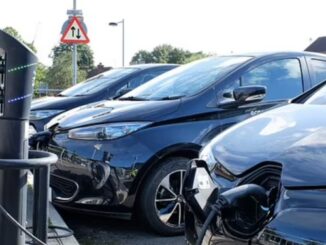
The auto industry is beginning to crank out more electric vehicles (EVs) to challenge Tesla, but there’s one big problem: not enough buyers.
Why it matters: The growing mismatch between EV supply and demand is a sign that even though consumers are showing more interest in EVs, they’re still wary about purchasing one because of price or charging concerns.
- It’s a “Field of Dreams” moment for automakers making big bets on electrification — they’ve built the cars, and now they’re waiting for buyers to come, says Jonathan Gregory, senior manager of economic and industry insights at Cox Automotive.
Driving the news: Cox Automotive experts highlighted the swelling EV inventories during a recent midyear industry review for journalists and industry stakeholders.
- EV sales, which account for about 6.5% of the U.S. auto market so far this year, are expected to surpass 1 million units for the first time in 2023, Cox forecasts.
- A Cox survey found that 51% of consumers are now considering either a new or used EV, up from 38% in 2021.
- Tesla’s rapid expansion, plus new EVs from other brands, are fueling the interest — 33 new models are arriving this year, and more than 50 new or updated models are coming in 2024, Cox estimates.
Yes, but: Sales aren’t keeping up with that increased output.
Details: The nationwide supply of EVs in stock has swelled nearly 350% this year, to more than 92,000 units.
- That’s a 92-day supply — roughly three months’ worth of EVs, and nearly twice the industry average.
- For comparison, dealers have a relatively low 54 days’ worth of gasoline-powered vehicles in inventory as they rebound from pandemic-related supply chain interruptions.
- In normal times, there’s usually a 70-day supply.
- Notably, Cox’s inventory data doesn’t include Tesla, which sells direct to consumers.
Zoom in: Some brands are seeing higher EV inventories than others.
- Genesis, the Korean luxury brand, sold only 18 of its nearly $82,000 Electrified G80 sedans in the 30 days leading up to June 29, and had 210 in stock nationwide — a 350-day supply, per Cox research.
- Other luxury models, like Audi’s Q4 e-tron and Q8 e-tron and the GMC Hummer EV SUV, also have bloated inventories well above 100 days. All come with hefty price tags that make them ineligible for federal tax credits.
- Imported models like the Kia EV6, Hyundai Ioniq 5 and Nissan Ariya are also stacking up — likely because they’re not eligible for tax credits either.
- Tesla’s price-cutting strategy could be taking a toll, too: The once-hot Ford Mustang Mach-E now has a 117-day supply. Ford says that’s the result of ramped-up production in anticipation of stronger third-quarter sales.
The intrigue: Hybrid vehicles have much lower inventory levels, supporting Toyota’s argument that consumers want a stepping stone to fully electric cars.
- There’s a relatively tight 44-day supply of hybrids industrywide, according to Cox.
- Toyotas are in particularly short supply — under 30 days each for Prius and RAV4 hybrids and plug-in hybrids.
Of note: Toyota’s only fully electric model, the Bz4X, has a 101-day supply.
- While Toyota recently announced a 3-row electric SUV and new battery technology that could double the range of future EVs, it’s sticking with a mix of hybrids, plug-in hybrids, and pure EVs for the foreseeable future.
What to watch: More charging infrastructure is coming, and EV prices should reach parity with gasoline vehicles around 2025, according to Bank of America Securities auto analyst John Murphy.
- Until then, automakers will be left waiting for EV buyers to show up.



